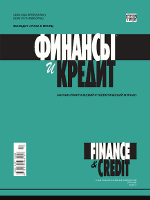Abstracting and IndexingРИНЦReferativny Zhurnal VINITI RAS Worldcat LCCN Permalink Google Scholar Online availableEastvieweLIBRARY.RU Biblioclub |
Structural changes in tax proceeds of consolidated budgets of constituent entities of the Russian Federation and in the mechanism of their distribution between regional and local budgets
Available online: 23 October 2014 Subject Heading: Taxes and taxation JEL Classification: Pages: 30-36
The article considers the distribution of tax revenues between the budgets of the Russian Federation's consolidated budget and analyzes the role of each status group of taxes in the tax revenues formation of consolidated budgets of the constituent entities of the Russian Federation. The paper analyzes the influence of recent amendments to the standards of allocation of individuals' income tax and taxes, which relate to special tax treatment, on the structure of tax revenues to regional and local budgets. The authors substantiate the possibilities and methods of maintaining significance of tax revenues in the formation of consolidated budgets of the constituent entities of the Russian Federation, increasing tax revenues of local budgets, and reducing the level of State allowance to regional and local budgets. The authors propose to transfer the rate of federal income tax (2%) to the regional rate thus raising it to 20% to compensate the income falling out the budgets of the constituent entities of the Russian Federation, which is caused by the introduced bonus depreciation. The change in the normative standard of charges on the income tax of individuals from 80 to 85% in favor of the regional budget and the allocation of tax proceeds under simplified taxation system to local budgets will enable to increase the level of financial independence of municipalities. The authors point out that it is expedient to separate the amount of allowance on regional and local taxes, which is granted to taxpayers under the Russian Tax Code, in the calculations of State allowances to regional and local budgets as amounts of conditional refunding of tax reduction. The authors emphasize that over the medium term, in order to ensure the stability of regional and local budgets, the Ministry of Finance of the Russian Federation plans the ultimate refusal of providing scheduled next federal privileges on regional and local taxes. In this case, any introduction of new federal tax privileges or preferences should entail the identification of the source of compensation of the falling out tax revenues. Keywords: tax proceeds, budgets, regulations, tax privileges, preferences, governmental grant References:
|
ISSN 2311-8709 (Online)
|
|








